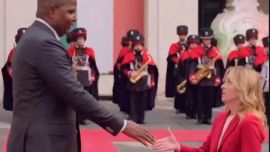President Javier Milei is at a turning point. Despite the good news this week, his chainsaw solo method seems to have reached its limit. Over the next few weeks, the President needs to make some pieces fit in a convoluted governing puzzle if he is to have a decent second half of the year and, eventually, a successful 2025.
The painful progress in the congressional debate over the ‘Ley de Bases’ bill and fiscal package is only one of those pieces. Another piece fell into place this week when (despite having being called “Communist assassins” by the President) the Chinese government agreed to reschedule US$5 billion due in June/July from the currency swap between the two countries. The next step is to make real progress with the International Monetary Fund on a new agreement for the country’s mammoth debt with the lender. Following that should come the acid test of lifting the ‘cepo’ capital controls. But for all this to happen, Milei needs to sort out how his administration functions.
Contrary to initial expectations, markets and investors grew impatient with the Milei administration before the Argentine public did. The foreign exchange gap widened before approval ratings polls dropped: Argentines continue to believe Milei will take them somewhere good, eventually. Markets rely less on hope than on facts. This week, the government showed progress in Congress, received approval from the IMF’s executive board, saw inflation going down and secured its currency deal with China. It was a good wrap for the first semester in office.
But the government needs to get in the habit of scoring goals. Milei may be starting to understand that, which is why he instructed brand-new Cabinet Chief Guillermo Francos to be flexible in negotiations with governors and congressional leaders to advance the ‘Ley de Bases’ bill. At this point, six months into office, Milei knows he needs to get something out of Congress, no matter exactly what that “something” is. Progress, not perfection.
Politically, it is clear by now that Milei will not assemble – at least until after next year’s midterm elections – a fixed working majority in Congress. His best hope is to gather allies issue-by-issue, using moveable coalitions to advance some of his reform programmes. Francos will have to be on top of it.
So will the IMF. Argentina accounts for 30 percent of its total outstanding credit to nations worldwide. This week, Economy Minister Luis Caputo reiterated that the country will seek a new agreement. He said he wanted “new money,” which would, in turn, be used to lift the capital controls. But will Caputo be the person to negotiate and implement a new agreement?
Milei said three weeks ago that once the ‘Ley de Bases’ bill’s congressional progress is complete, he would conduct a performance evaluation of his team and decide who stays and who goes. He also mentioned that Central Bank ex-governor, economist Federico Sturzenegger, would join the administration. Sturzenegger has been acting as an unofficial spokesman for Milei’s economic ideas, but it is still unclear where he would fit in as long as Caputo and his sidekick, the current Central Bank Governor Santiago Bausili, remain in their posts.
Last month, Milei mercilessly fired his Cabinet Chief and (former?) friend Nicolás Posse. He did not even receive a thank-you note from the President. On the contrary, Milei praises Caputo every chance he gets. But Caputo and Sturzenegger are arguably incompatible in the government together. Last we heard from Milei, he was defining “the contour” of Sturzenegger’s job description. It is difficult to imagine it would not overlap with Caputo’s.
Milei knows that if his economic programme is to succeed, the cepo needs to go this year. The way things are going, it is unlikely to go anywhere anytime soon. Reaching December with no news on that front would be bad news for the markets – and a major disappointment for the people Milei most attracts: foreign audiences. It is, of course, easier said than done. Caputo seems very comfortable with the currency restrictions, which help with his tactic of moving public debt from the Central Bank’s balance sheet to the Treasury in order to curb money-printing. But comfort is the enemy of progress.
If Milei needs to recreate expectations for the second half of the year and beyond, Caputo might not be the right person. Will it be Sturzenegger? Regardless of the name, the government seems to understand that this is a turning point and that obtaining the results the public will demand from now on (from lowering inflation further to showing the light at the end of the very deep tunnel of recession) might need a new approach – to both politics and economics.























Comments